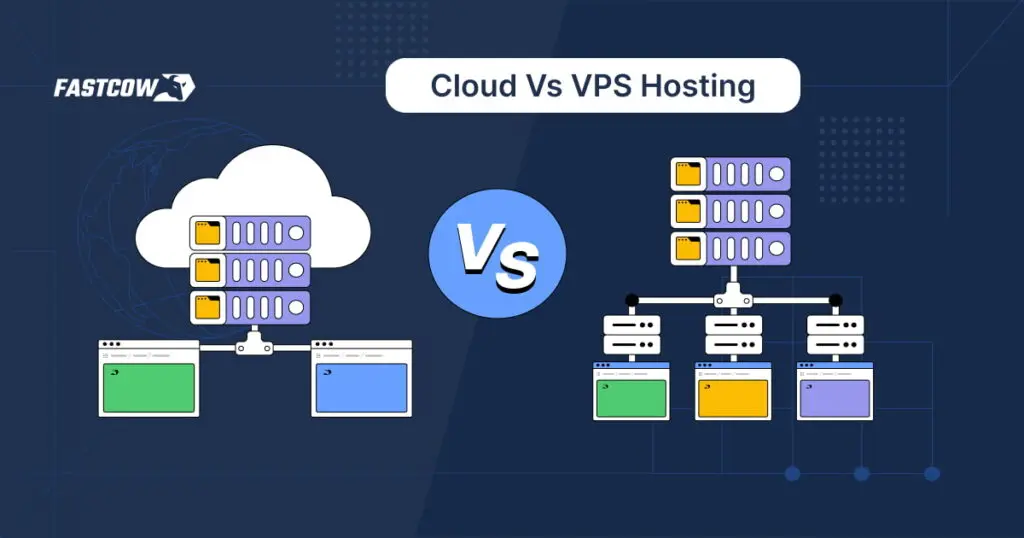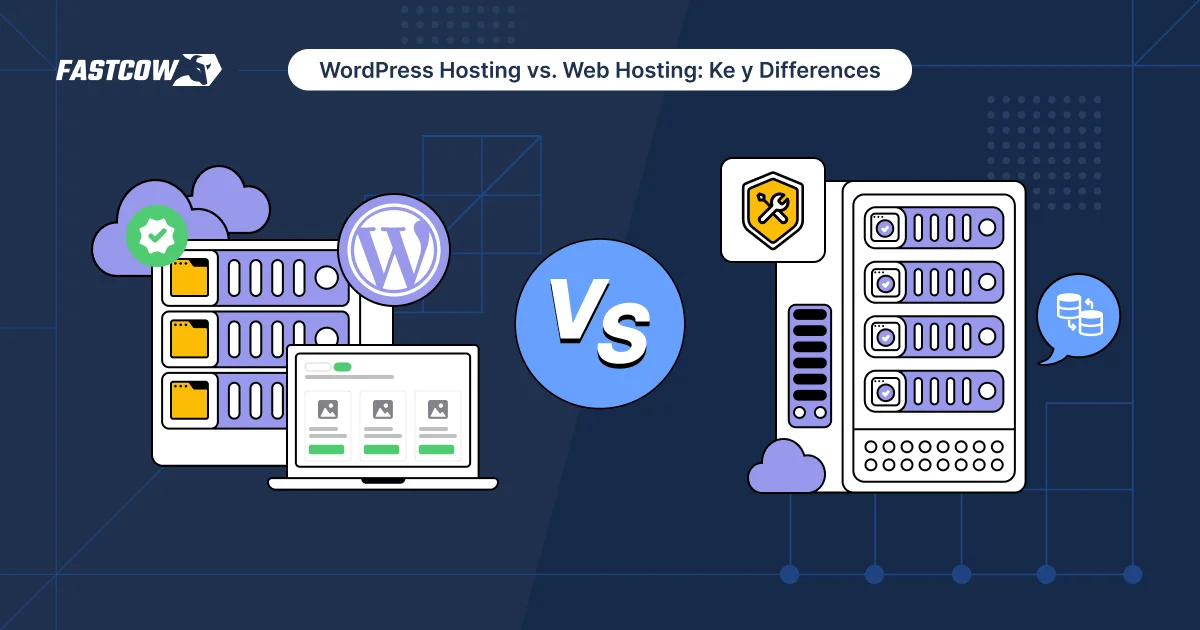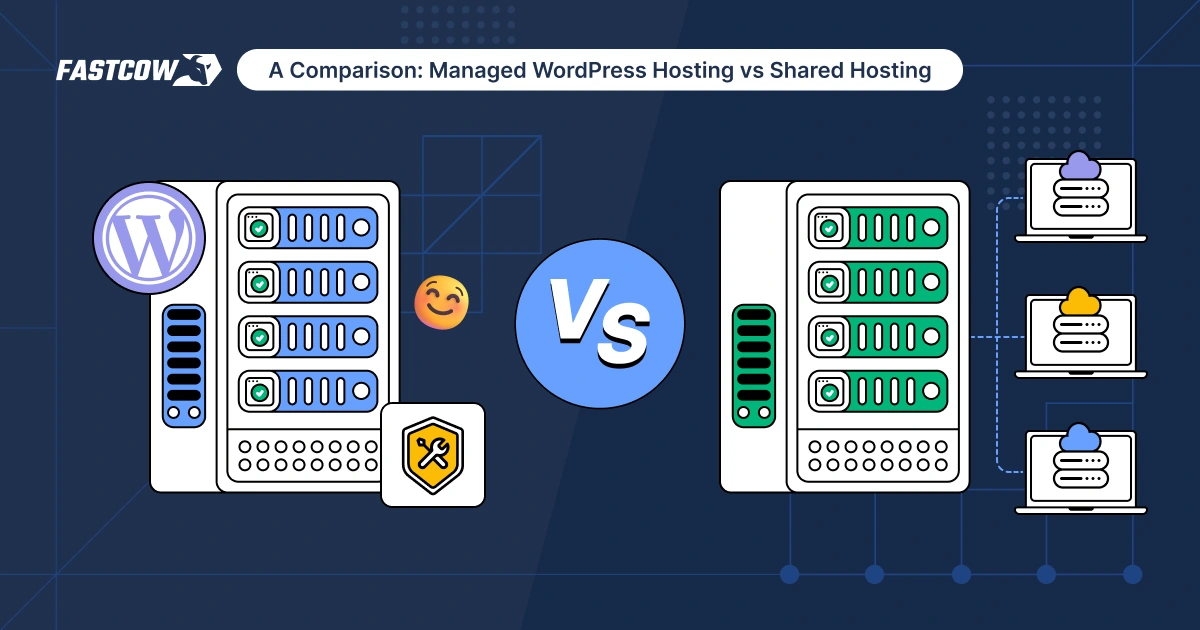
When starting a blog or website, most guides will advise you to start with shared hosting, and then when your site resource usage begins to exceed what shared hosting can provide, you can upgrade to the next best thing. But now you find yourself in a pickle – there is VPS hosting, and then there is Cloud hosting. You are probably wondering what is the difference between VPS and cloud hosting, and which one should you choose.
In this article, we will provide you with an unbiased cloud hosting vs VPS hosting comparison. We are going to compare their pricing, features, and benefits so that you can make a well-informed decision on the right hosting to choose for your website that is outgrowing shared hosting.
What is a Virtual Server?
When installing Windows or any other operating system on a computer device, you have the option to partition the hardware space. When you partition your PC, you get two independent storage in your PC. If one storage is affected by malware or virus, the other storage will not be affected. In the same manner, you can create multiple users on a computer and each user can log into their private environment.
This same principle is applied in virtualization when creating virtual machines but in this case, you are creating an independent computer on the partition and not just storage or a user. This means that in virtual machines, the storage, RAM, and processor are partitioned and shared.
A virtual server or machine as the name implies is a non-physical server run on a physical server (hardware) using virtualization. In order words, a virtual server is a server or group of servers on a physical hardware. Virtualization the technology behind VPS hosting and cloud hosting allows different virtual servers or operating systems to run independently on the same physical server while sharing the hardware resources.
Because the virtual servers are independently partitioned or isolated as separate operating systems, each virtual machine gets its own dedicated IP address, independent security system, and already preallocated or partitioned amount of the hardware’s resources such that anything that affects the website on one virtual server, e.g. malware attack, overload, etc can’t affect websites on the other virtual servers on that hardware.
What is Cloud Hosting?
Cloud hosting is a form of web hosting where your website is hosted on a virtual server that is built on a decentralized network of physical servers called a cloud.
A “cloud” is a distributed network comprising multiple interconnected physical servers at different locations across the globe. Each location where the servers making up a cloud are situated is called a data center.
Cloud hosting distributes the resources from the servers on the data centers that make up the cloud across the network and every virtual server on the cloud has access to the unlimited pool of resources.
With the use of a cloud component called a hypervisor, cloud hosting providers can start, deploy, and manage virtual servers on the cloud. Each virtual server deployed on the cloud has the potential to tap from the collective resources of all the servers on the network, including storage, bandwidth, RAM, and processing power.
When you host your website with cloud hosting, your website is given its own virtual server and is hosted on the cloud. This means your site is hosted or stored on multiple servers across the globe and has access to unlimited resources and processing power as compared to the traditional types of hosting, where your website is usually hosted on a single server.
What is VPS Hosting?
VPS hosting is a traditional form of web hosting where your website is hosted on a virtual server that is built on a single physical server in a particular location.
VPS is short for “Virtual Private Server”, and VPS hosting consists of several virtual private servers on one physical hardware. Each virtual server on a VPS hardware has its own private or dedicated space and allocated resources on that server, including storage, bandwidth, RAM, and processing power.
Unlike cloud hosting, the resources available to websites on VPS hosting are finite and confined to the resources available on the hardware. However, websites on VPS hosting are usually allocated a generous amount of the hardware’s resources and there is no intrusion of resources or competition for the hardware’s resources including storage, bandwidth, RAM, and processing power as in the case of shared hosting.
Cloud vs VPS: What are the Differences Between Cloud and VPS Hosting?
Now that we have clearly distinguished between Cloud and VPS hosting let’s see the difference between these two forms of web hosting in terms of features, pricing, and benefits.
Cloud hosting vs VPS - What are their Features?
So what do you get when you buy a Cloud or VPS hosting and which is better? We are going to compare both side by side for a better verdict.
1. Speed and Performance
One key feature for a good hosting and website experience is speed and performance. Users love fast-loading web pages and search engines favor sites with low speed index when ranking pages. With hosting optimized for speed and performance, you have little work cut out for you to make your site fast like a car with 600 horsepower and goes from 0 to 60 in 2.9 seconds.
So between Cloud hosting and VPS hosting, which of them upper hand when it comes to speed and performance?
Cloud Hosting
Cloud hosting doesn't fall short when it comes to speed and performance. With access to the combined resources of multiple servers on the cloud, websites hosted with cloud hosting can harness all that processing power to perform at optimal speed, and the presence of built-in CDNs, edge caching, and locations across the globe further ensures that websites are accessible at enhanced speed from anywhere in the World.
VPS hosting
VPS hosting does pretty well when it comes to speed and performance. Unlike shared hosting when all websites are yanking at the resources of the hardware at each other's expense, your website gets all its resources to itself. It gets a sizable chunk of the hardware’s resources including storage, processing power, and bandwidth making it capable of delivering optimal speed and performance.
2. Scalability and Flexibility
As your website grows in content and traffic, so does its demand on server resources. How easily can you adjust or upgrade your hosting plan so it can accommodate the increasing growth comes down to scalability and flexibility of the hosting.
Cloud hosting
Cloud hosting is super scalable and flexible thanks to the unlimited pool of resources readily available in the network allowing you to scale up or down at a moment’s notice in response to traffic spikes and increased demand in storage.
Cloud servers are capable of auto-scaling in order to dynamically adjust the amount of power at your website’s disposal based on its usage, and withstanding traffic spikes and high resource usage by distributing them across multiple hardware.
VPS Hosting
VPS hosting has limited resources because you are on a single hardware. In traditional VPS hosting, when your website demands more resources than is available or allocated to your virtual server, you will be required to upgrade to a higher plan. However, upgrading is not instant or flexible as with cloud hosting because upgrading your VPS hosting plan depends solely on customer support response time and the possibility of moving your website to another hardware.
VPS servers are optimized to handle high volumes of consistent traffic but it doesn't have a pool of resources from multiple hardwares like cloud hosting to withstand traffic spikes.
3. Availability and Uptime
Uptime is the amount of time a server remains online and accessible. Most hosting providers promise guaranteed uptime. However, no hardware is above experiencing faults and downtime. So VPS vs cloud, which can adapt when a server goes down?
Cloud hosting
Cloud hosting infrastructure possesses a feature known as a failover mechanism or redundancy that ensures consistent uptime, such that even when the hardware goes down, the hypervisor automatically moves your virtual server to another hardware. This means that your website rarely experiences any noticeable disruption.
Cloud hosting also ensures high availability and reduced latency since your website is distributed among data centers across the globe.
VPS Hosting
Your website remains online so long as the physical server on which it is hosted keeps running. But should the hardware develop any fault, your website VPS, along with the rest of the websites hosted on the same server, will experience downtime. How quickly your website will be back online depends solely on the extent of the fault and your VPS hosting provider's response time in fixing the issue or deploying your virtual server on another hardware.
In terms of availability, your website has high availability and low latency to regions near the data center where your hardware is located but low availability and high latency to those afar. To increase your website availability to farther regions, you may have to employ the use of third-party CDNs.
4. Security
When it comes down to it, any hosting provider worth its salt will have state-of-the-art security measures in place. However between VPS vs cloud servers, which will secure and protect your website and sensitive data better?
Cloud hosting
Cloud hosting servers are interconnected and that can be a red flag when it comes to security. However, that’s not the case as cloud hosting is normally fortified with security features such as DDoS protection, malware scanning, data encryption, web application firewalls (WAFs), failover mechanism, disaster recovery, and automated site backups. Cloud hosting is also usually managed for you by the provider who actively monitors the site for vulnerabilities and releases security patches.
VPS hosting
VPS hosting is typically secure. VPS is isolated and shielded from other virtual servers on the machine keeping it protected from any vulnerabilities that may affect another virtual server on the machine. VPS hosting is also fortified with advanced layers of security features such as protection against brute force and DDoS attacks, access control, automated backups, etc.
5. User-intuitive Interface
The ability to easily navigate and customize your hosting space is another important feature to compare between VPS vs cloud hosting.
Cloud hosting
Cloud hosting is complex to deploy and customize at the infrastructural or enterprise level. However, there are user-centric cloud hosting providers with user-intuitive interfaces that make it easy to deploy, manage, and customize websites. But they impose limited control on users.
VPS hosting
VPS hosting grants full control and customization options but requires technical expertise to fully customize the VPS. VPS gives root access allowing you to configure your virtual server to your standard, just like a dedicated server. The user interface may not be user-intuitive to inexperienced end users.
6. Managed Hosting
Web hosting infrastructure requires regular updates and maintenance to keep your virtual server in the best condition. Winging your website maintenance is risky and a lot could go wrong if you don't know what you are doing. Managed hosting involves your hosting provider doing all the heavy lifting on the server side for you while you focus on your website.
Cloud hosting
Cloud hosting infrastructure is managed by the provider including maintenance, patches, software updates, and server administration.
VPS Hosting
VPS machines give you full control and that includes server management and administration. However, some hosting providers offer fully managed services and handle them for you.
7. Pricing
Lastly, between cloud and VPS, which is cheaper? And what's the pricing difference impact on budgeting or meeting business needs?
Cloud hosting
Cloud hosting packages cost between $10–$100 or more. However, cloud hosting adopts a flexible pay-as-you-go pricing system that lets you scale and pay for only what you use.
VPS Hosting
VPS offers fixed-tier payment plans with different amounts of resources ranging also from $10-$100. If your website exceeds its allocated usage, you have to upgrade to a higher plan with more resources.
Cloud hosting vs VPS: Features Comparison Table
| Features | Cloud hosting | VPS |
| Speed | Yes | Yes |
| Performance | Yes | Yes |
| Scalability | Yes | No |
| Flexibility | Yes | No |
| Availability | Yes | Yes |
| Traffic fluctuations/spikes | Yes | No |
| Uptime | Yes | Yes |
| Fail-over or redundancy | Yes | No |
| Security | Yes | Yes |
| Server administration | No | Yes |
| User control & customization | No | Yes |
| Intuitive interface | Yes & No | Yes & No |
| Manintenance services | Yes | Yes & No |
| Cost consideration | $20 to $100 monthly | $20 to $100 monthly |
Cloud Hosting vs VPS - The Benefits
We can extract the benefits of using Cloud hosting and VPS hosting from the features comparison. Let's highlight them for you to see.
Benefits of Cloud hosting
Some of the key advantages of cloud hosting include:
- Dedicated virtual server and IP
- Optimized performance and security
- Ease of scalability up and down
- Global accessibility and reduced latency
- Unlimited pool of resources
- Adaptability to traffic spikes
- Guaranteed uptime with a fail-over mechanism
Benefits of VPS hosting
The advantages of using a VPS server include:
- Dedicated isolated virtual server and IP
- Root access and server control
- Optimized performance and security layering
- Accommodation of large volumes of traffic
Cloud hosting vs VPS - Which One is good for individuals or businesses?
From the underlying side-by-side comparison between Cloud hosting and VPS hosting, we can see that both have their own appeal and are suitable for those switching from shared hosting, whether business or individual.
Although cloud hosting is undoubtedly the better choice, VPS still has its moments where it shines. If you are looking for more control and an isolated environment to do your own thang, then VPS is ideal for you.
But if your website gets an overwhelming amount of traffic and you desire seamless scalability when it fluctuates, then cloud hosting is for you.
Who is cloud hosting suitable for?
Cloud hosting is suitable for e-commerce websites with fluctuating traffic, SaaS platforms, individuals such as bloggers, websites that employ the use of data streaming such as vlogs and podcasts, and startups on a budget that wish to take advantage of the pay-as-you-go pricing feature of cloud hosting.
Who is VPS hosting suitable for?
VPS hosting is suitable for project managers and developers, WaaS platforms, online platforms, and businesses that deal with tons of user data such as payment processors, online forums and communities, and medium-sized businesses with consistently large traffic.
FastCow Managed Cloud Hosting for Growing Businesses
If you are interested in managed cloud hosting, check out FastCow managed cloud hosting.
FastCow managed cloud hosting infrastructure supports all sizes of businesses including WordPress and WooCommerce, Shopify, Magento, etc.
We deliver fully managed services, blazing-fast loading times, ironclad security, reliable and scalable pricing, a user-friendly dashboard, and 24/7 expert support. And we always monitor and protect your website against threats.
FAQs
What is the difference between VPS and cloud hosting?
VPS hosting hosts sites on servers in a particular location while cloud hosting hosts sites on interconnected servers in different locations across the globe.
Is VPS faster than shared hosting?
Absolutely. Unlike shared hosting where every site on the server is competing for resources and affecting each other’s speed, VPS have more resources to itself thereby giving you uninterferred website speed.
Is VPS better than VPN?
VPS (virtual private server) and VPN (virtual private network) are two different things entirely – VPS is for hosting websites and applications while VPNs is for browsing the internet anonymously.
How many websites can you host on a VPS?
You are usually permitted to host an unlimited number of websites on your virtual server.
How much does a cloud server cost per month?
Cloud server costs somewhere between $20-$100 monthly depending on the package. Some hosting provider may offer free trials or cheaper or discounted prices. For example, FastCow managed cloud hosting entry package costs $1 for the first month and $12.70 monthly thereafter.
Should I use vps or cloud?
It depends on your website needs. If you want a hosting that can handle large traffic volumes while cloud hosting can handle traffic spikes.
What is the difference between web hosting and cloud hosting?
Web hosting typically refers to traditional types of hosting where websites are hosted on a singular physical server including shared, VPS, and dedicated hosting, while cloud hosting refers to recent technology where websites are hosted on a network of computers known commonly as a cloud. But in a sense, cloud hosting is still a type of web hosting.
Can I start a web hosting business using a VPS?
Yes. You can use VPS to run a hosting business successfully. However, you will have a lot of workload setting up, deploying, and managing websites for your clients. You can choose to work smarter not harder by opting for managed VPS hosting or managed cloud hosting.
Is the cloud safer than a server?
Cloud infrastructures are usually powered by giant companies that plummet a lot of money keeping it safe with state-of-the-art security technologies and deploying security patches. A hosting provider also secure and protect their servers from vulnerabilities but they may not have enough resources for ironclad security systems. Cloud servers also have fail-over that moves your data to another server on the network when one fails but a physical server may lose all its data if it fails without having a backup elsewhere.
What happens if a cloud server fails?
If a cloud server fails, the fail-over system automatically redistributes your data to other servers on the network keeping your data safe and minimizing website downtime.
































